Introduction
The 2024 Philippines National Survey on the Mental Health of LGBTQ+ Young People is the first country-wide survey to focus on LGBTQ+ young people and individual and socioeconomic factors that influence their mental health. While more recent national demographic studies have begun to capture information on sexual orientation and gender identity (SOGI), this survey is the first of this scale to examine LGBTQ+ youth mental health in the Philippines.
This project was led by The Trevor Project and the Psychological Association of the Philippines (PAP) LGBT Psychology Special Interest Group, the first formally recognized collective of psychologists and allied mental health professionals in Southeast Asia.
The Trevor Project
In Collaboration With

Psychological Association of the Philippines
The Psychological Association of the Philippines (PAP), founded in 1962, is committed to promoting excellence in psychology’s teaching, research, and practice and its recognition as a scientifically oriented discipline for human and social development. The PAP is the Accredited Integrated Professional Organization (AIPO) for registered psychometricians and psychologists of the Professional Regulation Commission (PRC). It is the oldest and largest professional organization of psychologists in the country.
Visit Website
PAP LGBT Psychology Special Interest Group
The PAP LGBT Psychology SIG is a growing collective of visible and active members with a shared LGBT-affirmative framework. We endeavor to empower LGBT Filipinos and improve societal well-being by generating and championing the utilization of evidenced-based resources on LGBT psychology, strengthening various areas of psychological practice, and participating in matters of public interest. We partner with PAP Divisions, other SIGs, and regional chapters through collaboration on activities for PAP members and the general public, creation of safe spaces for LGBT members, promotion of policies that support LGBT rights and well-being, and eradication of practices that undermine human dignity.
Visit Website
Marc Eric S. Reyes (he/him/his)
Professor at the University of Santo Tomas (UST) Psychology Department who holds a bachelor's degree in psychology from Colegio de San Juan de Letran-Manila, a master's degree, and a doctorate in Clinical Psychology from the UST-Graduate School. A Licensed Psychologist and Psychometrician who has significantly impacted the field since 2003. Former Psychological Association of the Philippines Board Member and President. He is also a lifetime member, a board trustee of the Philippine Mental Health Association, Inc., and an elected member of the American Psychological Association Membership Board. On July 17, 2022, he received a Presidential Citation from the American Psychological Association for his "exceptional leadership of psychology in the Philippines and globally, particularly his dedication to social issues and his commitment to mentorship." His research interests and advocacy span various essential topics, including Suicidology, LGBT Psychology, Social Media Use, and Children with Special Needs.
Visit Website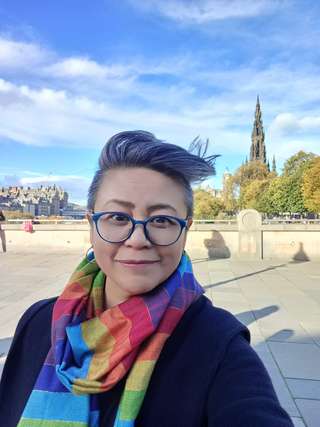
Moniq M. Muyargas (she/her/them/they)
Assistant Professor in the Division of Social Sciences, University of the Philippines Visayas (UPV). Has a Master of Psychology degree from the Ateneo de Manila University and undergraduate degree in BA Psychology from UP Visayas. Former Director of the Gender and Development Program, University of the Philippines Visayas. Specialises in the teaching of Psychology, qualitative research and methodologies, and gender and sexualities. A member of the American Psychological Association and the Psychological Association of the Philippines (PAP). Has been the national co-chairperson of the Teaching Psychology Special Interest Group (2014-2021) and an active member of the LGBT Psychology Special Interest Group of the PAP. At present, a PhD candidate in Counselling Studies (Research) in the School of Health in Social Science at the University of Edinburgh, Scotland. Has also worked as teaching staff (2023-2024) of the School of Health in Social Science teaching Qualitative Research Methodologies in Counselling Research for Masters and PhD students of the University of Edinburgh.
Visit Website
Junix Jerald I. Delos Santos (he/him/his)
Junix Jerald Delos Santos is currently a Ph.D. student in Psychology at the Ateneo de Manila University. He holds a master’s degree in psychology from Saint Louis University (Philippines) and serves as an assistant professor at the University of Baguio. Junix is an active member of various professional organizations in psychology, including the Psychological Association of the Philippines (PAP). Currently, he co-chairs the PAP Teaching Psychology Special Interest Group (SIG) and is a core member of the PAP LGBT Psychology SIG. From 2020 to 2021, Junix represented the Philippines in the American Psychological Association’s Global Psychology Learning Leadership Institute as an emerging leader, where he developed a project against LGBTQIA+ prejudice and discrimination in the Philippines. He is a doctoral fellow at Boston College, having participated in its Global Engagement's Summer Visiting Doctoral Research Fellowship in Summer 2023.
Visit Website
Jan Gabriel M. Castañeda (he/they)
Jan (He/They) is currently the Client and Provider Engagement Executive of Mindcare Club and a consultant at We Thrive Wellbeing and Consultancy Services. Since 2013, he has been a member of the LGBT Psychology Special Interest Group of the Psychological Association of the Philippines. From 2016 to 2021, he served with ASEAN SOGIE Caucus, a human rights network advocating for the human rights of LGBTQ+ people in Southeast Asia. Since 2018, he has been a board member of Youth Voices Count, a network for young LGBTQ+ people's human rights in the Asia-Pacific. He has worked within various spheres over the years, including the UP Center for Women's Studies, the Pambansang Samahan sa Sikolohiyang Pilipino, Circle of Hope, and the Epidemiology Bureau of the Department of Health.
Visit Website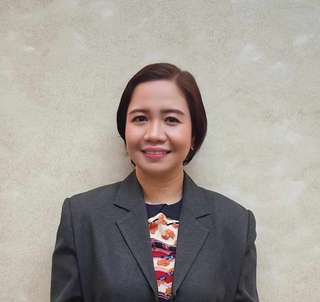
Angelie D. Bautista (she/her)
Angelie D. Bautista is an Assistant Professor at the University of Santo Tomas (UST)-Psychology Department. She is a registered guidance counselor with 20 years of practice in the counseling profession. She has a PhD degree in Clinical Psychology from UST-Graduate School. She is a two-time awardee of the St. Albertus Magnus Award for Outstanding Research Work from UST. She won best paper awards at the research congresses organized by the Philippine Guidance and Counseling Association (PGCA), and the Quezon City University-Asia-Pacific Consortium of Researchers and Educators (APCORE) for her research work on suicide recovery. She is a member of PGCA and an affiliate member of the Psychological Association of the Philippines (PAP). Further, she is an international affiliate of the American Psychological Association and a member of the International Association for Suicide Prevention (IASP). She joined the PAP LGBT Psychology SIG and the IASP Education and Training in Suicide Prevention SIG. Research travel grants were awarded to her to present her research studies in IASP conferences.
Visit Website
Beatriz A. Torre (she/her)
Beatriz A. Torre is currently a Ph.D. student in Critical Social/Personality Psychology at the City University of New York Graduate Center. She holds a master’s degree in psychology from University of the Philippines-Diliman, where she also serves as an assistant professor. Beatriz was one of the founding members of the PAP LGBT Psychology SIG, serving as its co-coordinator from 2013 to 2017 and as its chairperson from 2018 to 2022. Her research and public engagement has been recognized with a number of awards, including the Post-Graduate Award from the British Psychological Society - Psychology of Sexualities and Outstanding Graduate Thesis Award from the PAP for her masters thesis on everyday sexism among Filipino women of diverse sexual orientations, as well as the One UP Faculty Grant Award for Outstanding Research and Public Service in UP Diliman. Her research interests include LGBTQ+ mental health, stigma and prejudice on the basis of gender, sexual orientation, and gender identity, friendships across sexual orientation, and exercise participation and motivation.
Visit Website
Key Findings
3 in 4 (75%) LGBTQ+ young people have ever seriously considered suicide, and nearly half (46%) have ever attempted suicide. More than one in three (34%) attempted suicide in the past year.
The majority reported recent symptoms of depression (62%) and anxiety (62%), as well as engaging in self-harm in the past year (59%).
Nearly 1 in 5 (19%) LGBTQ+ young people reported being threatened with or subjected to conversion therapy, which was related to higher rates of mental health concerns.
Nearly two-thirds (63%) saw their LGBTQ+ identity as a burden, and more than half (58%) did not feel comfortable interacting with others as their true selves, which were both related to higher rates of depression, anxiety, and self-harm.
Feeling affirmed in one’s LGBTQ+ identity, living in an accepting community, receiving helpful therapy, and developing healthy coping strategies were all associated with lower rates of mental health concerns.
Mental Health & Suicide Risk:
Suicide Risk
3 in 4 LGBTQ+ young people (75%) have ever seriously considered suicide. Over half (59%) of LGBTQ+ young people considered suicide in the past year.
Nearly half of the LGBTQ+ young people (46%) have ever attempted suicide, and more than one-third (34%) attempted suicide in the past year.
Rates of LGBTQ+ young people who have ever considered or attempted suicide
Explore Data by:
-
Ages 15-18
-
Ages 19-24
-
Gay
-
Lesbian
-
Bisexual
-
Queer
-
Pansexual
-
Asexual
-
Sexually fluid
-
Questioning
-
Nonbinary
-
Questioning
-
Cisgender men
-
Cisgender women
-
Transgender men
-
Transgender women
-
Bicolano
-
Bisaya
-
Cebuano
-
Ilocano
-
Ilonggo
-
Kapampangnan
-
Tagalog
-
Waray
-
An ethnicity not listed above (includes Maranao and Tausug)
* Note: Ethnicity not significant for attempting suicide ever.
-
Food-insecure
-
Food-secure
-
Roman Catholic
-
Protestant
-
Iglesia ni Cristo
-
Other Christian Denominations
-
Religions not listed here (includes Aglipay and Islam)
-
No religion
Rates of LGBTQ+ young people who considered or attempted suicide in the past year
Explore Data by:
-
Ages 15-18
-
Ages 19-24
-
Gay
-
Lesbian
-
Bisexual
-
Queer
-
Pansexual
-
Asexual
-
Sexually fluid
-
Questioning
-
Nonbinary
-
Questioning
-
Cisgender men
-
Cisgender women
-
Transgender men
-
Transgender women
-
Bicolano
-
Bisaya
-
Cebuano
-
Ilocano
-
Ilonggo
-
Kapampangnan
-
Tagalog
-
Waray
-
An ethnicity not listed above (includes Maranao and Tausug)
* Note: Ethnicity not significant for attempting suicide ever.
-
Food-insecure
-
Food-secure
-
Roman Catholic
-
Protestant
-
Iglesia ni Cristo
-
Other Christian Denominations
-
Religions not listed here (includes Aglipay and Islam)
-
No religion
Depression & Anxiety
62% of LGBTQ+ young people reported symptoms of depression, and 62% reported symptoms of anxiety in the past two weeks.
75% of LGBTQ+ young people reported considering self-harm in the past year. Of those, 59% self-harmed in the past year.
Rates of LGBTQ+ young people who experienced recent depression and anxiety
Explore Data by:
-
Ages 15-18
-
Ages 19-24
-
Gay
-
Lesbian
-
Bisexual
-
Queer
-
Pansexual
-
Asexual
-
Sexually fluid
-
Questioning
-
Nonbinary
-
Questioning
-
Cisgender men
-
Cisgender women
-
Transgender men
-
Transgender women
-
Food-insecure
-
Food-secure
Experienced symptoms of depression
-
Roman Catholic
-
Protestant
-
Iglesia ni Cristo
-
Other Christian Denominations
-
Religions not listed here (includes Aglipay and Islam)
-
No religion
* Note: Religion not significant for recent anxiety.
Rates of LGBTQ+ young people who considered self-harm or self-harmed
Explore Data by:
-
Ages 15-18
-
Ages 19-24
-
Gay
-
Lesbian
-
Bisexual
-
Queer
-
Pansexual
-
Asexual
-
Sexually fluid
-
Questioning
-
Nonbinary
-
Questioning
-
Cisgender men
-
Cisgender women
-
Transgender men
-
Transgender women
Considered self-harm in the past year
-
Food-insecure
-
Food-secure
* Note: Food security not significant for self-harm in the past year.
Self-harmed in the past year
-
Roman Catholic
-
Protestant
-
Iglesia ni Cristo
-
Other Christian Denominations
-
Religions not listed here (includes Aglipay and Islam)
-
No religion
* Note: Religion not significant for considering self-harm in the past year.
Considered self-harm in the past year
-
Luzon
-
Visayas
-
Mindanao
* Note: Region not significant for self-harm in the past year.
Mental Health Care:
Access to Care
Despite 77% wanting therapy at some point in their lives, only 15% have ever received it. 82% of LGBTQ+ young people wanted therapy in the past year, but only 9% received it.
For those who did receive therapy, doing so was associated with lower rates of mental health concerns, including suicide risk.
LGBTQ+ young people who ever received therapy & received therapy in the past 12 months
Have you ever received psychological or emotional counseling/therapy from a counselor, psychologist or mental health care professional?
-
23% No, don’t want it
-
62% No, but I want to
-
7% Yes, but it wasn’t helpful
-
8% Yes, and it was helpful
In the past 12 months, have you wanted psychological or emotional counseling/therapy from a counselor, psychologist or mental health care professional?
-
18% No
-
73% Yes, but I didn’t get it
-
9% Yes, and I got it
LGBTQ+ young people who received psychological or emotional counseling/therapy from a professional and suicide risk
-
Considered suicide ever
-
Considered suicide in the past year
-
Attempted suicide ever
-
Attempted suicide in the past year

Risk Factors for LGBTQ+ Young People
Risk factors are things that make the risk of suicide or poor mental health greater for LGBTQ+ young people. Within this sample, risk factors included things like being threatened with or subjected to conversion therapy, experiencing homelessness or anti-LGBTQ+ victimization, and having barriers to mental health care.
Conversion Therapy
19% of LGBTQ+ young people reported having ever been threatened with or subjected to conversion therapy.
Young people who reported ever being threatened with or subjected to conversion therapy reported higher rates of past-year suicide attempts, self harm, and mental health concerns compared to young people who did not.
LGBTQ+ young people who reported being threatened with or subjected to conversion therapy
-
81% Never threatened with or subjected to conversion therapy
-
5% Ever threatened with conversion therapy
-
14% Ever subjected to conversion therapy
Homelessness
12% of LGBTQ+ young people reported being homeless currently or in the past due to running away or being kicked out by their parents/caregivers. Of those who ran away or were kicked out, 30% said it was due to their LGBTQ+ identity
Experiences of homelessness were associated with higher rates of suicide risk, depression, anxiety, and self-harm among LGBTQ+ young people.
LGBTQ+ young people who experienced homelessness were more likely to report considering or attempting suicide compared to those who did not
-
Considered suicide ever
-
Considered suicide in the past year
-
Attempted suicide ever
-
Attempted suicide in the past year
Anti-LGBTQ+ Victimization
Experiencing anti-LGBTQ+ victimization, such as being physically threatened or discriminated against because of their sexual orientation or gender identity, was associated with higher rates of suicide risk and other mental health concerns among LGBTQ+ young people.
34% of LGBTQ+ young people reported that they had ever been physically threatened or abused because of their sexual orientation or gender identity.
74% reported that they had ever experienced discrimination due to their sexual orientation or gender identity.
Suicide risk among LGBTQ+ young people based on their experiences of being victimized due to their sexual orientation or gender identity
-
Considered suicide ever
-
Considered suicide in the past year
-
Attempted suicide ever
-
Attempted suicide in the past year
Suicide risk among LGBTQ+ young people based on their experiences of being discriminated against due to their sexual orientation or gender identity
-
Considered suicide ever
-
Considered suicide in the past year
-
Attempted suicide ever
-
Attempted suicide in the past year
Self-Stigma Among LGBTQ+ Young People
Self-stigmatization happens when people internalize negative stereotypes about the identities they hold. Self-stigmatization has been shown to contribute to poor mental health.
Nearly two-thirds (63%) of LGBTQ+ young people said their identity was a burden, and more than half (59%) did not feel comfortable interacting with others as their true selves.
The majority of LGBTQ+ young people (72%) said they were able to enjoy their rights and privileges as an LGBTQ+ person, and they did not believe they’d be happier if they were not who they are (72%).
Freedom and comfort being their true selves among LGBTQ+ young people
Do you feel free and comfortable interacting with others as your true self?
-
9% Never
-
50% Sometimes
-
24% Often
-
18% Always
* Note: Due to rounding, categories may sum to > 100%.
Do you feel that you could be happier if you were not who you are?
-
36% Never
-
36% Sometimes
-
14% Often
-
15% Always
Perceiving sexual orientation and/or gender identity as a burden
Explore Data by:
-
Does not believe SOGI is a burden
-
Believes SOGI is a burden
-
Does not believe SOGI is a burden
-
Believes SOGI is a burden
Comfort interacting with others as your true self & suicide risk
-
Considered suicide ever
-
Considered suicide in the past year
-
Attempted suicide ever
-
Attempted suicide in the past year
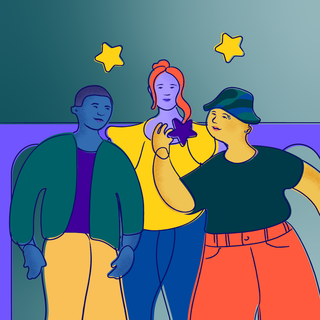
Protective Factors for LGBTQ+ Young People
Protective factors are factors that are associated with lower suicide risk and better mental health among LGBTQ+ young people.
In this sample, protective factors included things like living in a community that is accepting of LGBTQ+ people, having friends and family that are supportive of your LGBTQ+ identity, and other individual or social factors like resilience, self-esteem, or social support from friends and family.
Protective Factors for LGBTQ+ Young People:
LGBTQ+ young people who reported living in a community that is accepting of LGBTQ+ people had lower rates of considering and attempting suicide, depression, and anxiety.
Those who reported having support for their sexual orientation or gender identity and access to LGBTQ±affirming spaces reported lower rates of depression and anxiety.
Engaging in a religious practice at least once every two months was associated with lower reported rates of considering or attempting suicide, engaging in self-harm, and depression and anxiety.
Transgender and nonbinary young people who reported having people in their lives who respected their pronouns had lower rates of suicide, depression, and anxiety.
Rates of considered and attempted suicide among LGBTQ+ young people by protective factors
Explore Data by:
- Social Relationships
- Individual Factors
- Physical Activity
- School and/or Work Factors
- Family Factors
- Faith
- Professional Mental Health or Other Clinical Support
-
Attempted suicide ever
-
Attempted suicide in the past year
-
Attempted suicide ever
-
Attempted suicide in the past year
-
Attempted suicide ever
-
Attempted suicide in the past year
-
Attempted suicide ever
-
Attempted suicide in the past year
-
Attempted suicide ever
-
Attempted suicide in the past year
-
Attempted suicide ever
-
Attempted suicide in the past year
Accepting Communities
Acceptance of communities where LGBTQ+ young people sleep
-
47% Accepting
-
36% Tolerating
-
17% Unaccepting
Comparison of LGBTQ+ young people who reported considering suicide by accepting communities
-
Accepting
-
Tolerating
-
Unaccepting
Supportive relationships
How many LGBTQ+ young people have sexual orientation/gender identity support?
Someone is supportive of your sexual orientation
-
6% No
-
94% Yes
Someone is supportive of your gender identity
-
3% No
-
97% Yes
Comparison of depression and anxiety and having sexual orientation/gender identity support among LGBTQ+ young people
Has anyone in your life been supportive of your sexual orientation?
-
Symptoms of depression
-
Symptoms of anxiety
Has anyone in your life been supportive of your gender identity?
-
Symptoms of depression
-
Symptoms of anxiety
Religion
The majority (74%) of LGBTQ+ young people in the PH reported engaging in a religious practice at least once every two months.
Nearly two-thirds (63%) of LGBTQ+ young people identified their religion as Roman Catholic, and less than a fifth (16%) indicated having no religion.
Engaging in a religious practice at least once every two months was associated with lower reported rates of considering and attempting suicide, engaging in self-harm, and depression and anxiety.
LGBTQ+ young people in the Philippines who reported considering and attempting suicide in relation to pronoun respect
How many people in your life respect your pronouns?
Explore Data by:
-
None of the people I know
-
A few/
Some of the people I know -
A lot/
Most/ All of the people I know
-
None of the people I know
-
A few/
Some of the people I know -
A lot/
Most/ All of the people I know
Methodology
The content and methodology for The Trevor Project’s 2024 Philippines National Survey on the Mental Health of LGBTQ+ Young People was approved by an independent Institutional Review Board in the United States and a local independent Institutional Review Board in the Philippines, The Philippine Social Science Council-Social Science Ethics Review Board.
Acknowledgments
This report was led by The Trevor Project's Research Team in the United States, in collaboration with our academic partners Marc Eric S. Reyes, Beatriz A. Torre, Angelie D. Bautista, Jan Gabriel M. Castañeda, Junix Jerald I. Delos Santos, and Moniq M. Muyargas of the Psychological Association of the Philippines’ LGBT Psychology Special Interest Group. The authors of this report acknowledge the contributions of the following individuals: Dr. Derrick Matthews, Kevin Wong, Dr. Will Cole, Marissa Cohnen, Dr. Myeshia Price, Nathanio Strimpopulos, Nolan Scott, Paul Pham, Alfredo Pizaña, Igor Avilés, Megan Ford, Miranda Jaramillo, Nelson Fernandez, William Young, Zach Eisenstein, and the Psychological Association of the Philippines. Special thanks are also extended to all the participants for their valuable time and insights.
Suggested citation
Reyes, M.E.S, Torre, B.T., Bautista, A.D., Castañeda, J.G.M., Delos Santos, J.J.I., Muyargas, M.M., Taylor, A.B., Eden, T. M., Hobaica, S., Lara, E.A., Jauregui, J.C., Jarrett, B.A., Suffredini, K., & Nath, R. (2024). 2024 Philippines national report on the mental health of LGBTQ+ young people. West Hollywood, California: The Trevor Project
(c) The Trevor Project 2024
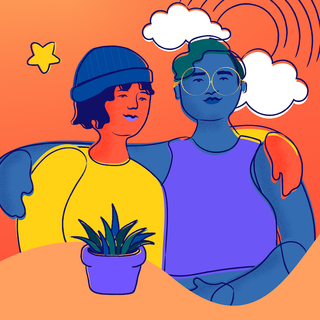
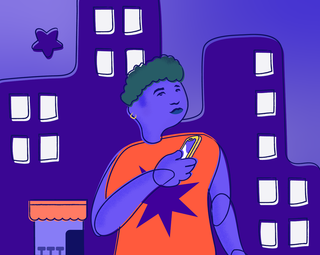
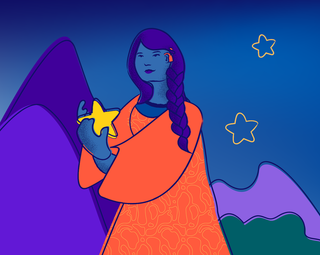
Attempted suicide ever
Attempted suicide in the past year